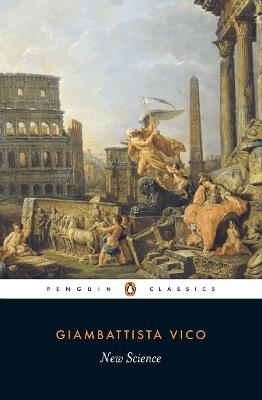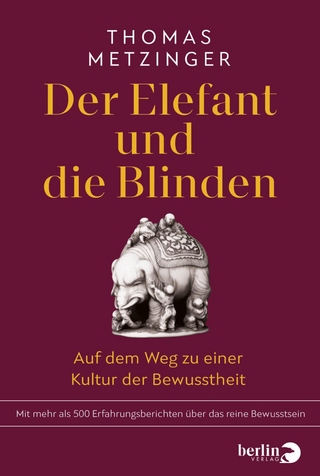
New Science
Penguin Classics (Verlag)
978-0-14-043569-6 (ISBN)
Barely acknowledged in his lifetime, the New Science of Giambattista Vico (1668-1744) is an astonishingly perceptive and ambitious attempt to decipher the history, mythology and laws of the ancient world. Discarding the Renaissance notion of the classical as an idealised model for the modern, it argues that the key to true understanding of the past lies in accepting that the customs and emotional lives of ancient Greeks and Romans, Egyptians, Jews and Babylonians were radically different from our own. Along the way, Vico explores a huge variety of topics, ranging from physics to poetics, money to monsters, and family structures to the Flood. Marking a crucial turning-point in humanist thinking, New Science has remained deeply influential since the dawn of Romanticism, inspiring the work of Karl Marx and even influencing the framework for Joyce's Finnegan's Wake.
Although Vico (1668-1744) lived his whole life as an obscure academic in Naples, his New Science is an astonishingly ambitious attempt to decode the history, mythology and law of the ancient world.
Translated by David Marsh with an Introduction by Anthony GraftonIntroduction by Anthony Grafton
Translator's Preface
Idea of the Work
Explanation of the Frontispiece
Book 1: Establishing Principles
Chronological Table
Section 1. Notes on the Chronological Table
Section 2. Elements
Section 3. Principles
Section 4. Method
Book 2: Poetic Wisdom
Prolegomena
Introduction
Chapter 1. Wisdom in General
Chapter 2. Introduction to Poetic Wisdom and its Divisions
Chapter 3. The Universal Flood and the Giants
Section 1. Poetic Metaphysics
Chapter 1. Poetic Metaphysics as the Origin of Poetry, Idolatry, Divination, and Sacrifices
Chapter 2. Corollaries on the Principal Aspects of the New Science
Section 2. Poetic Logic
Chapter 1. Poetic Logic
Chapter 2. Corollaries on Poetic Figures of Speech, Monsters, and Metamorphoses
Chapter 3. Corollaries on the Speech in Poetic Archetypes of the First Nations
Chapter 4. Corollaries on the Origins of Languages and Letters; Including the Origins of Hieroglyphics, Laws, Names, Family Arms, Medals, and Money; and the Origins of the First Language and Literature of the Natural Law of Nations
Chapter 5. Corollaries on the Origins of Poetic Style, Digressions, Inversions, Prose Rhythm, Song, and Verse
Chapter 6. Further Corollaries
Chapter 7. Final Corollaries on Logic in Educated People
Section 3. Poetic Morality
Chapter 1. Poetic Morality and the Origins of the Common Virtues Taught by Religion through the Institution of Matrimony
Section 4. Poetic Economics, or Household Management
Chapter 1. Household Management in Nuclear Families
Chapter 2. Extended Families of Family Servants as Essential to the Founding of Cities
Chapter 3. Corollaries on Contracts Sealed by Simple Consent
Chapter 4. A Principle of Mythology
Section 5. Poetic Politics
Chapter 1. Poetic Politics: The Severely Aristocratic Form of the First Commonwealths
Chapter 2. All Commonwealths Arise from Invariable Principles of Fiefs
Chapter 3. Origins of the Census and Public Treasury
Chapter 4. The Origins of Roman Assemblies
Chapter 5. Corollary: Divine Providence Ordains both Commonwealths and the Natural Law of Nations
Chapter 6. Heroic Politics Continued
Chapter 7. Corollaries on Roman Antiquities, Particularly the Imaginary Monarchy at Rome and the Imaginary Popular Liberty Established by Junius Brutus
Chapter 8. Corollary on the Heroism of the First Peoples
Section 6. Epitomes of Poetic History
Chapter 1. Epitomes of Poetic History
Section 7. Poetic Physics
Chapter 1. Poetic Physics
Chapter 2. Poetic Physics of the Human Body: Heroic Nature
Chapter 3. Corollary on Heroic Statements
Chapter 4. Corollary on Heroic Descriptions
Chapter 5. Corollary on Heroic Customs
Section 8. Poetic Cosmography
Chapter 1. Poetic Cosmography
Section 9. Poetic Astronomy
Chapter 1. Poetic Astronomy
Chapter 2. Astronomical, Physical, and Historical Proof that All Ancient Pagan Nations Shared Uniform Astronomical Principles
Section 10. Poetic Chronology
Chapter 1. Poetic Chronology
Chapter 2. Canon of Chronology for Determining the Origins of Universal History, Which Much Antedate the Monarchy of Ninus, its Traditional Starting Point
Section 11. Poetic Geography
Chapter 1. Poetic Geography
Chapter 2. Corollary on Aeneas' Arrival in Italy
Chapter 3. Names and Descriptions of Heroic Cities
Conclusion
Book 3: Discovery of the True Homer
Section 1. The Search for the True Homer
Introduction
Chapter 1. The Esoteric Wisdom Attributed to Homer
Chapter 2. Homer's Native Land
Chapter 3. Homer's Age
Chapter 4. Homer's Incomparable Gift for Heroic Poetry
Chapter 5. Philosophical Proofs for the Discovery of the True Homer
Chapter 6. Philological Proofs for the Discovery of the True Homer
Section 2. Discovery of the True Homer
Introduction
Chapter 1. Inconsistencies and Improbabilities in the Traditional Homer Become Consistent and Necessary in the Homer Discovered Here
Chapter 2. Homer's Epics: Two Great Repositories of the Natural Law of the Greeks
Appendix: A Rational History of the Dramatic and Lyric Poets
Book 4: The Course of Nations
Introduction
Section 1. Three Kinds of Human Nature
Section 2. Three Kinds of Customs
Section 3. Three Kinds of Natural Law
Section 4. Three Kinds of Government
Section 5. Three Kinds of Language
Section 6. Three Kinds of Symbols
Section 7. Three Kinds of Jurisprudence
Section 8. Three Kinds of Authority
Section 9. Three Kinds of Reason
Chapter 1. Divine Reason and Reason of State
Chapter 2. Corollary on the Ancient Romans' Wisdom of State
Chapter 3. Corollary: The Fundamental History of Roman Law
Section 10. Three Kinds of Judgments
Chapter 1. First Kind: Divine Judgments
Chapter 2. Corollary on Duels and Reprisals
Chapter 3. Second Kind: Ordinary Judgments
Chapter 4. Third Kind: Human Judgments
Section 11. Three Schools of Thought
Chapter 1. Schools of Thought in Religious, Punctilious, and Civil Ages
Section 12. Further Proofs Drawn from the Properties of Heroic Aristocracies
Introduction
Chapter 1. The Guarding of Boundaries
Chapter 2. The Guarding of Social Orders
Chapter 3. The Guarding of the Laws
Section 13
Chapter 1. Further Proofs Drawn from Mixed Commonwealths which Combine Earlier Governments with Later States
Chapter 2. An Eternal and Natural "Royal Law" By Which Nations Come to Rest in Monarchies
Chapter 3. A Refutation of the Principles of Political Theory Based on the System of Jean Bodin
Section 14. Final Proofs Confirming the Course of Nations
Chapter 1. Punishments, Wars, and the Order of Numbers
Chapter 2. Corollary: Ancient Roman Law as Serious Epic Poem, and Ancient Jurisprudence as Severe Poetry Containing the First Rough Outlines of Legal Metaphysics; also, the Legal Origins of Greek Philosophy
Book 5: The Resurgence of Nations and the Recurrence of Human Institutions
Introduction
Chapter 1. Medieval Barbaric History Illuminated by Ancient Barbaric History
Chapter 2. The Recurrence of the Invariable Nature of Fiefs, and the Recurrence of Ancient Roman Law in Feudal Law
Chapter 3. Description of the Ancient and Modern Worlds in the Light of the New Science
Conclusion of the Work
On the Eternal Natural Commonwealth, Best in its Kind, Ordained by Divine Providence
Index and Glossary
| Erscheint lt. Verlag | 29.4.1999 |
|---|---|
| Einführung | Anthony Grafton |
| Übersetzer | David Marsh |
| Verlagsort | London |
| Sprache | englisch |
| Maße | 130 x 196 mm |
| Gewicht | 380 g |
| Themenwelt | Geisteswissenschaften ► Philosophie ► Geschichte der Philosophie |
| Geisteswissenschaften ► Philosophie ► Philosophie der Neuzeit | |
| ISBN-10 | 0-14-043569-7 / 0140435697 |
| ISBN-13 | 978-0-14-043569-6 / 9780140435696 |
| Zustand | Neuware |
| Haben Sie eine Frage zum Produkt? |
aus dem Bereich


